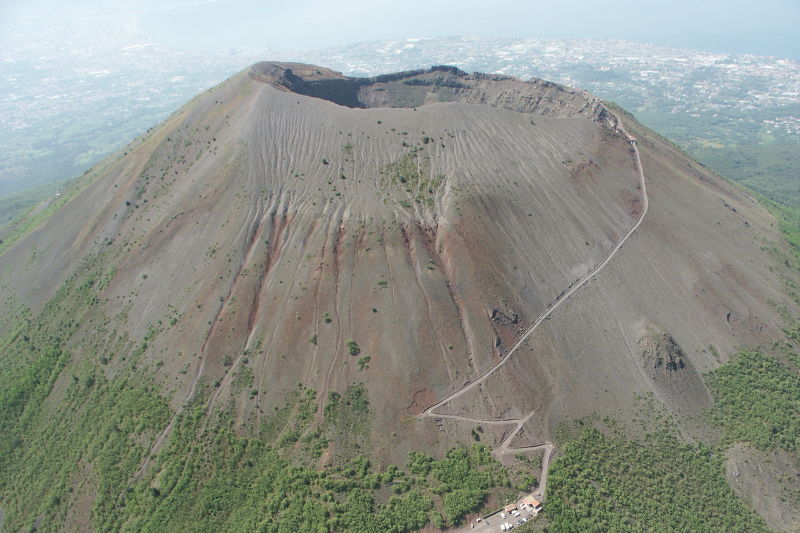What to do - Vesuvius

Knowing the risk and the Civil Protection Plan is a task for all of us.
Share what you know in your family, at school, with friends and colleagues: spreading information about volcanic risk is a collective responsibility to which we all must contribute.
You can better prepare to deal with a possible emergency with simple actions.
- Verify if the area where you live, work, or stay is in the red or yellow zone.
- Find out about your municipality's Civil Protection Plan.
- If you or a family member needs special assistance (people with disabilities, older people), report it to the municipality.
- Stay informed about the status of volcanic activity through INGV's Vesuvius Observatory website, institutional websites, social media, and hotline numbers.
- Earthquakes often precede volcanic eruptions. Therefore, verify that your home is safe and take all necessary measures to avoid situations that may pose a danger.
- Join volcanic hazard exercises and information meetings organized in your area.
During this operational phase, volcano monitoring is intensified, and Civil Protection Plans are verified.
Already in the attention phase, thus well before a potential eruption, volcanic activity can result in dangerous phenomena, such as earthquakes. Therefore, keep in mind behaviours related to seismic risk.
If you live in the red zone
Ask your municipality about the Civil Protection Plan to learn about evacuation routes and waiting areas. When the authorities give the directions, evaluate whether you will evacuate with your car, or the vehicle provided by the civil protection. Be sure to notify your municipality if you or a family member has special assistance needs for evacuation and accommodation in alternative housing. Also, consider whether you will relocate to another home owned by you or by relatives or friends outside the red and yellow zones, receiving financial assistance from the State.
Otherwise, you can take advantage of the accommodations offered by the State in the Region or Autonomous Province twinned with your municipality.
At this operational phase, the most time-consuming and complex operations planned for the red zone begin, including relocation of people in hospitals and penitentiary institutions, displacement of farm animals, and safeguarding major cultural properties.
If you live in the red zone
If you already want to evacuate in this phase, you can do it with a financial contribution from the State. Please remember to inform your municipality.
If you decide to stay, be prepared to evacuate when the authorities will order so:
• Make a list of essentials to bring (documents, medicines, eyeglasses, etc.).
• Learn about the evacuation routes to be followed.
• If you plan to use the means provided by civil protection, notify your municipality, and point out any pets' presence to arrange their transport.
• If you still need to do it, inform your municipality if you or a family member has special needs for assistance.
• If you or a family member is hospitalized, you will be transferred to another healthcare facility that may not be in the Region twinned with your Municipality.
• Remember that during this phase, access to the red zone will be restricted for safety reasons.
If you live in the yellow zone
Ensure you have protective masks, dust glasses, food, water, medicine, flashlight, and ash removal tools. If you or a family member has a respiratory or cardiovascular condition, consult your doctor to know how to protect your/their health.
In this operational phase, the IT-alert message is sent to alert of a potential upcoming eruption. In the alarm phase, evacuation of the population from the red zone is planned. The maximum estimated time for the evacuation is three days (72 hours). Operations are coordinated by civil protection authorities.
If you live in the red zone
Once the evacuation order has been issued, go home, and pack your suitcase. Remember to take essentials (documents, medicines, etc.). Do not waste time securing unnecessary possessions and items. Before you leave home close doors and windows and turn off the electrical, gas, and water systems.
If you decide to leave the area autonomously, follow only the evacuation routes provided in the Plan, according to the established timetables. Make sure your car has sufficient fuel.
If you choose assisted transportation, get to the waiting area assigned to you by the Municipality's Civil Protection Plan, according to the timetable provided. You may bring your pet with you according to the arrangements provided by your municipality.
The red zone exclusion may last for a long time, and access to the area will be controlled by police forces.
If you live in the yellow zone
Be prepared for possible temporary evacuation as well.
All people in the red zone have autonomously found accommodation outside the red zone or have been relocated to the twinned Regions or Autonomous Provinces.
If you live in the yellow zone
If your area is suffering from heavy volcanic ash fallout, you must temporarily leave your home at the request of civil protection authorities. You will be assigned accommodation within the Campania Region.
Before drinking water from the tap, make sure that municipal ordinances or notices do not ban it; wash well any food that has come in contact with volcanic ashes.
If your area has not been evacuated during volcanic ash fallout, stay indoors with windows closed.
Please wear a protective mask and dust glasses if you must go outside.
It is extremely dangerous to drive on ash-covered roads. Your car can get damaged and impede emergency vehicles. Avoid the use of motorcycles.